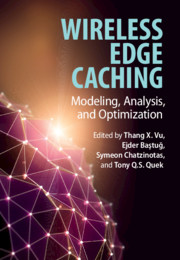Book contents
- Frontmatter
- Contents
- List of Contributors
- Preface
- 1 Introduction
- Part I Optimal Cache Placement and Delivery
- Part II Proactive Caching
- Part III Cache-Aided Interference and Physical Layer Management
- Part IV Energy-Efficiency, Security, Economic, and Deployment
- 15 Energy-Efficient Deployment in Wireless Edge Caching
- 16 Cache-Enabled UAVs in Wireless Networks
- 17 Physical Layer Security for Edge Caching Wireless Networks
- 18 Mobile VR Edge Delivery: Computing, Caching, and Communication Trade-Offs
- 19 Economic Ecosystems in Elastic Wireless Edge Caching
- Index
19 - Economic Ecosystems in Elastic Wireless Edge Caching
from Part IV - Energy-Efficiency, Security, Economic, and Deployment
Published online by Cambridge University Press: 19 October 2020
- Frontmatter
- Contents
- List of Contributors
- Preface
- 1 Introduction
- Part I Optimal Cache Placement and Delivery
- Part II Proactive Caching
- Part III Cache-Aided Interference and Physical Layer Management
- Part IV Energy-Efficiency, Security, Economic, and Deployment
- 15 Energy-Efficient Deployment in Wireless Edge Caching
- 16 Cache-Enabled UAVs in Wireless Networks
- 17 Physical Layer Security for Edge Caching Wireless Networks
- 18 Mobile VR Edge Delivery: Computing, Caching, and Communication Trade-Offs
- 19 Economic Ecosystems in Elastic Wireless Edge Caching
- Index
Summary
In this chapter, we study the technoeconomic challenges for one of the most promising new caching paradigms, the elastic wireless edge caching solution, by which third parties dynamically lease storage resources in a wireless cloud. The main idea is the following: a mobile network operator (MNO) advertises storage prices for servers placed in proximity to the end users, and various content providers lease on-demand capacity to improve the quality of their services. We describe the main concepts and existing business models for the elastic CDN solution, provide an overview of the related work, and discuss the key differences between in-network and edge caching. We then present a detailed model for this system where the caches reside in cellular base stations. We formulate a problem where cache dimensioning, content caching, and request routing decisions are jointly optimized by a central processor (CP) to reduce content delivery delay, subject to a given leasing budget. We design a suite of dynamic solution algorithms, based on the Lyapunov drift-minus-benefit technique and present numerical experiments that quantify the benefits of elastic over typical static cache deployments
Information
- Type
- Chapter
- Information
- Wireless Edge CachingModeling, Analysis, and Optimization, pp. 387 - 407Publisher: Cambridge University PressPrint publication year: 2021
Accessibility standard: Unknown
Why this information is here
This section outlines the accessibility features of this content - including support for screen readers, full keyboard navigation and high-contrast display options. This may not be relevant for you.Accessibility Information
- 1
- Cited by
